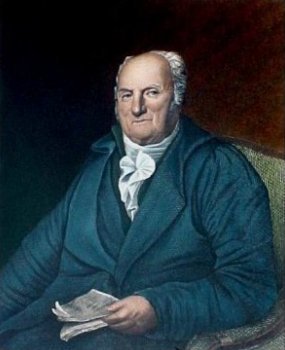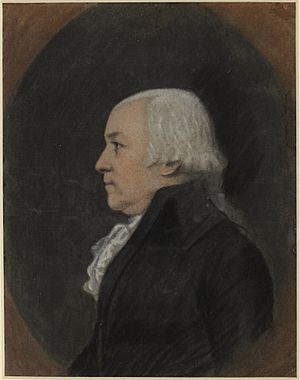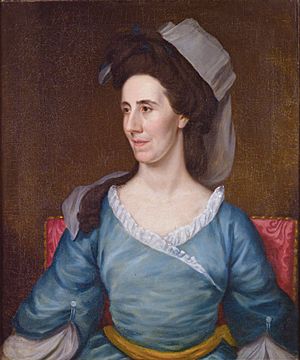Elias Boudinot facts for kids
Quick facts for kids
Elias Boudinot
|
|
|---|---|
 |
|
| Director of the United States Mint | |
| In office October 1795 – July 1805 |
|
| President | George Washington John Adams Thomas Jefferson |
| Preceded by | Henry William de Saussure |
| Succeeded by | Robert Patterson |
| Member of the U.S. House of Representatives from New Jersey's At-large district |
|
| In office March 4, 1789 – March 4, 1795 |
|
| Preceded by | none |
| Succeeded by | Thomas Henderson |
| 2nd President of the Confederation Congress | |
| In office November 4, 1782 – November 2, 1783 |
|
| Preceded by | John Hanson |
| Succeeded by | Thomas Mifflin |
| Personal details | |
| Born | May 2, 1740 Philadelphia, Province of Pennsylvania, British America |
| Died | October 24, 1821 (aged 81) Burlington, New Jersey, U.S. |
| Resting place | Saint Marys Episcopal Churchyard, Burlington, New Jersey, U.S. |
| Signature | |
Elias Boudinot (pronounced il-EYE-əs boo-DIN-ot; May 2, 1740 – October 24, 1821) was an important American lawyer and statesman from Elizabeth, New Jersey. He played a key role in the early days of the United States. He was a delegate to the Continental Congress and served as its President from 1782 to 1783. After the American Revolutionary War, he became a U.S. Congressman for New Jersey. Later, President George Washington chose him to be the Director of the United States Mint, a job he held from 1795 to 1805.
Contents
Early Life and Education
Elias Boudinot was born in Philadelphia, Pennsylvania, on May 2, 1740. His father, Elias Boudinot III, was a merchant and silversmith. His mother, Mary Catherine Williams, was from the British West Indies.
Elias's family had a fascinating history. His paternal grandfather, Elie Boudinot, was a Huguenot (a French Protestant). The family had to leave France around 1687 to escape religious persecution by King Louis XIV. They found a new home in New York.
Elias was one of nine children, but only four, including Elias, lived to adulthood. His older sister, Annis, became one of the first published women poets in the Thirteen Colonies. His brother, Elisha Boudinot, became a top judge in New Jersey.
Elias studied at home before going to Princeton, New Jersey. There, he learned about law by working as an apprentice for Richard Stockton. Stockton was a lawyer who later signed the Declaration of Independence. He was also Elias's brother-in-law, as he had married Elias's sister Annis.
Career Beginnings
In 1760, Elias Boudinot became a lawyer. He started his own law practice in Elizabeth, New Jersey. His business grew, and he became a well-known lawyer in the area.
Family Life
On April 21, 1762, Elias Boudinot married Hannah Stockton (1736–1808). Hannah was Richard Stockton's younger sister. They had two children, but sadly, their first child, Maria, died very young. Their second child, Susan Vergereau Boudinot, grew up and married William Bradford. He became a chief judge in Pennsylvania and later the Attorney General under President George Washington.
After her husband died in 1795, Susan Boudinot Bradford moved back home with her parents. She helped organize her father's important papers. These papers are now kept at Princeton University and give us a lot of information about the time of the American Revolution.
In 1805, Elias, Hannah, and Susan moved to a new home in Burlington, New Jersey. Hannah passed away a few years later, and Elias lived in Burlington for the rest of his life.
Later Years and Public Service
In his later years, Elias Boudinot invested in land, especially in Ohio. He owned a lot of land in what is now Green Township, near Cincinnati. There's even a street named after him there! When he died, he left a large amount of land (about 13,000 acres) to the city of Philadelphia for parks and other city needs. He was buried in the churchyard of St. Mary's Church in Burlington, New Jersey.
Political Journey
As the American Revolution approached, Boudinot joined the Whigs, a group that supported American independence. In 1775, he was elected to the New Jersey assembly. He actively encouraged people to join the army and even loaned money to military leaders to buy supplies. Boudinot also helped support American spies who gathered information on the British army.
In May 1777, George Washington asked Boudinot to become the commissary general for prisoners. This meant he was in charge of managing enemy prisoners and making sure American prisoners held by the British received supplies. He was given the rank of colonel in the Continental Army for this important work. He served until July 1778.
In November 1777, New Jersey chose Boudinot to be a delegate to the Second Continental Congress. He couldn't attend right away because of his duties as commissary. He finally joined the Congress on July 7, 1778, and continued to care about the well-being of prisoners of war.
Boudinot returned to Congress in 1781. In November 1782, he was chosen as President of the Continental Congress for one year. This was mostly a ceremonial role, but he handled a lot of important letters and signed official documents. On April 15, 1783, he signed the Preliminary Articles of Peace, which helped end the Revolutionary War.
When the new United States government was formed in 1789, Boudinot was elected from New Jersey to the United States House of Representatives. He served for three terms and generally supported the government's actions. He chose not to join the political parties that were starting to form.
In 1794, he decided not to run for another term in Congress. In October 1795, President George Washington appointed him as Director of the United States Mint. He held this position, overseeing the making of U.S. coins, until he retired in 1805.
Supporting Good Causes
Besides his political roles, Elias Boudinot supported many important civic, religious, and educational causes. He was a trustee of the College of New Jersey (now Princeton University) for almost 50 years. When the Continental Congress had to leave Philadelphia in 1783, he moved the meetings to Princeton, where they met in the college's Nassau Hall.
In 1789, after the new U.S. Constitution was drafted, Congressman Boudinot suggested that the House and Senate ask President Washington to declare a day of thanksgiving. He believed it was important for all Americans to thank God for the blessings they had received.
Boudinot was a strong supporter of the Presbyterian faith. He helped start the American Bible Society and served as its President after 1816. He also wrote a book called The Age of Revelation to respond to another book that questioned religious beliefs.
He was a champion for the rights of both Black people and American Indian citizens. He even helped students attend a school for Native Americans in Connecticut. One young Cherokee student, named Gallegina Uwatie (also known as Buck Watie), stayed with Boudinot on his way to school. They were so impressed with each other that Gallegina asked for and received permission to use Boudinot's name. This young man later became known as Elias Boudinot and was an editor of the Cherokee Phoenix, the first newspaper of the Cherokee Nation.
Legacy and Honors
Elias Boudinot's legacy lives on in many ways:
- The Boudinot-Stockton papers and family items are kept at the Princeton University Library.
- Elias Boudinot Elementary School in Burlington, New Jersey is named after him.
- Several streets and places are named in his honor, including:
- Boudinot Street in Philadelphia
- Boudinot Avenue in Cincinnati, Ohio
- Boudinot Place in Elizabeth, New Jersey
- Boudinot Street in Princeton, New Jersey
- Boudinot Lane in Franklin Township, New Jersey
- The Boudinot-Southard-Ross Farmstead in Bernards Township, New Jersey is also connected to his family.
Quotes
- "Be religiously careful in our choice of all public officers...and judge of the tree by its fruits."
- "Good government generally begins in the family, and if the moral character of a people once degenerate, their political character must soon follow."
- "For nearly half a century have I anxiously and critically studied that invaluable treasure [the Bible]; and I still scarcely ever take it up that I do not find something new – that I do not receive some valuable addition to my stock of knowledge or perceive some instructive fact never observed before. In short, were you to ask me to recommend the most valuable book in the world, I should fix on the Bible as the most instructive both to the wise and ignorant. Were you to ask me for one affording the most rational and pleasing entertainment to the inquiring mind, I should repeat, it is the Bible; and should you renew the inquiry for the best philosophy or the most interesting history, I should still urge you to look into your Bible. I would make it, in short, the Alpha and Omega of knowledge; and be assured, that it is for want of understanding the scriptures, both of the Old and New Testament, that so little value is set upon them by the world at large."
Archival Collections
The Presbyterian Historical Society in Philadelphia has a collection of letters and legal papers related to Elias Boudinot from 1777 to 1821. Many of the letters from 1777–1778 are about trading and releasing prisoners during the Revolutionary War.
 | William M. Jackson |
 | Juan E. Gilbert |
 | Neil deGrasse Tyson |



